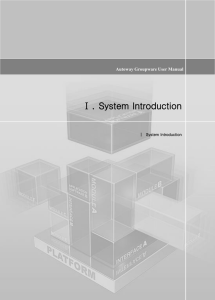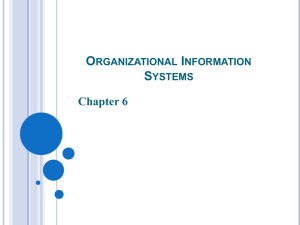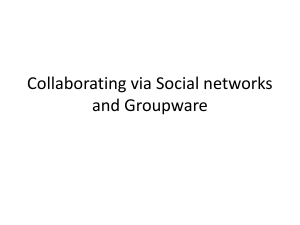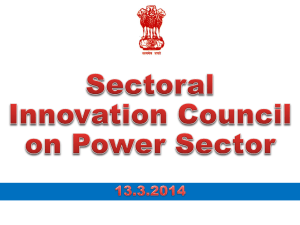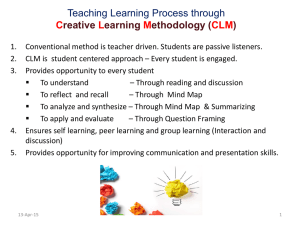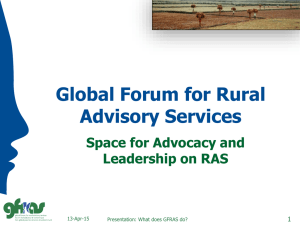CSCW Introduction
advertisement
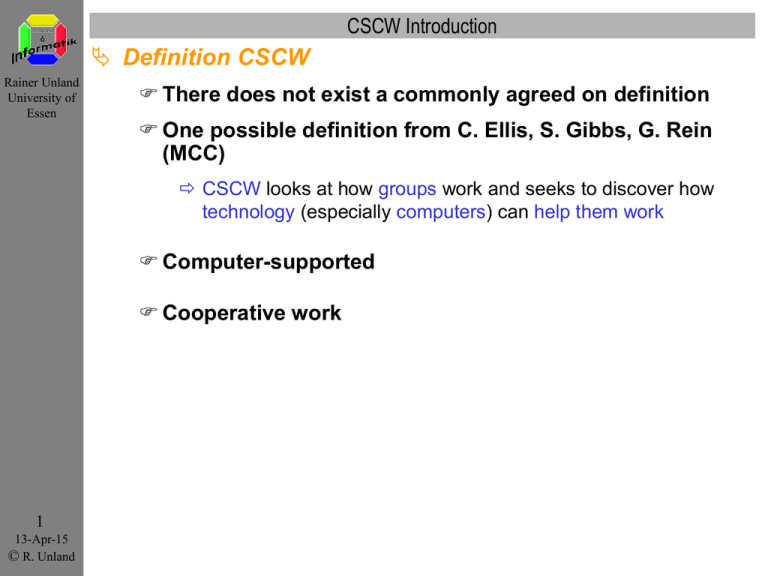
CSCW Introduction Definition CSCW Rainer Unland University of Essen There does not exist a commonly agreed on definition One possible definition from C. Ellis, S. Gibbs, G. Rein (MCC) CSCW looks at how groups work and seeks to discover how technology (especially computers) can help them work Computer-supported Cooperative work 1 13-Apr-15 © R. Unland CSCW Introduction Involved Sciences Rainer Unland University of Essen 2 13-Apr-15 © R. Unland Social science Organizational science Work science / Ergonomics Anthropology Psychology (Group dynamics, Interface design), (Applied) Computer science (Implementation) Economy Artificial Intelligence CSCW Introduction Definition Groupware Rainer Unland University of Essen Robert Johansen: ... a generic term for specialized computer aids that are designed for the use of collaborative work groups. Typically, these groups are small project-oriented teams that have important tasks and tight deadlines. Groupware can involve software, hardware, services, and/or group process support. C. Ellis, S. Gibbs, G. Rein (MCC) 1st: Computer-based systems that support groups of people engaged in a common task (or goal) and that provide an interface to a shared environment C. Ellis, S. Gibbs, G. Rein (MCC) 2nd: 3 13-Apr-15 © R. Unland Class of applications, for small groups and for organizations, arising from the merging of computers and large information bases and communications technology. These applications may or may not specially support cooperation. Software for small or narrowly focused groups, not organizationwide support CSCW Introduction Definition Groupware Rainer Unland University of Essen H. Krasner, J. McInroy, D. WalzGroupware is computer technology that 1. actively facilitates two or more users working on a common task, possibly simultaneously, using a shared environment and 2. provides synergistic mechanisms for coordinating each user's actions with respect to the rest of the group and the system. H. Lewe, H. Krcmar The notion of Groupware indicates the computer-based support of work groups or project teams. Support may mean support by special software and hardware, by information and communication services as well as support of group work. In contrast to individual data processing with groupware collaboration / cooperation are important issues. Groupware in a narrow sense is a tool, which can only be used by a group but not by an individual. 4 13-Apr-15 © R. Unland CSCW Introduction Definition Groupware Rainer Unland University of Essen Of immense importance for (real-time) groupware are the features of communication, collaboration, and coordination. Communication Communication model: Sender – Receiver model A message is delivered from the sender to the receiver via a (predefined) channel Oral communication E-mail 5 13-Apr-15 © R. Unland CSCW Introduction Definition Groupware Rainer Unland University of Essen Coordination Cooperation needs to be coordinated Coordination permits to model the dependencies between goals, activities and actors (Mlone & Crowstone) Coordination, e. g., requires significant control 6 13-Apr-15 © R. Unland CSCW Introduction Definition Groupware Rainer Unland University of Essen Collaboration Means to support each other in a given way 7 13-Apr-15 © R. Unland CSCW Introduction Definition Groupware Rainer Unland University of Essen Atmosphere during work can best be described by so called "C"Words (Robert Kling): Cooperation, conflict, conviviality, competition, collaboration, commitment, caution, control, coercion, coordination, combat 8 13-Apr-15 © R. Unland CSCW Introduction Classification of CSCW Rainer Unland University of Essen Time same different Same place Different time (asynchronous) Different place Different time (asynchronous) same Same place Same time (synchronous) Different place Same time (synchronous) different Place 9 13-Apr-15 © R. Unland CSCW Introduction Classification of CSCW Rainer Unland University of Essen Communication-oriented synchronous tools: Support the synchronous exchange of (all kind of) messages between a group of participants Participants can be at the same or different locations Same location: Meeting support systems Different location: 10 13-Apr-15 © R. Unland CSCW Introduction Meeting support systems Rainer Unland University of Essen "If any substantial reduction were to be made in the executive working days ..., the most fruitful place to begin would be to cut down on conference time" (Case, 1962). No agreed on notation yet; possible terms are: Group Decision Support Systems (GDSS) Electronic Meeting Systems (EMS) Computer Aided Team (CATeam) Group Support System (GSS) (combined name for Group Communication Support Systems and Group Decision Support Systems) 11 13-Apr-15 © R. Unland CSCW Introduction Meeting support systems Rainer Unland University of Essen "If any substantial reduction were to be made in the executive working days ..., the most fruitful place to begin would be to cut down on conference time" (Case, 1962). No agreed on notation yet; possible terms are: Group Decision Support Systems (GDSS) Electronic Meeting Systems (EMS) Computer Aided Team (CATeam) Group Support System (GSS) (combined name for Group Communication Support Systems and Group Decision Support Systems) 12 13-Apr-15 © R. Unland CSCW Introduction Distinction between CSCW <-> Groupware Rainer Unland University of Essen 1. Groupware and CSCW mean the same 2. Groupware is the more restricted notion It only considers (small) groups but not large organizations Groupware mainly concentrates on the technology while CSCW also tries to understand and consider human behavior Groupware implies that some kind of Software and Hardware is involved/used 14 13-Apr-15 © R. Unland CSCW Introduction Rainer Unland University of Essen 15 13-Apr-15 © R. Unland Although the prospects of groupware appear bright, we must take into account a history of expensive and repetitive failure. Applications such as video conferencing and on-line calendars have largely been disappointments.
